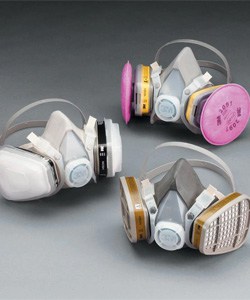- « Back to Database Search
-

-
Respirator Q & A
-

-
What are respirators? How do they differ from cloth and surgical face masks?
According to the National Institute for Occupational Safety and Health (NIOSH), respirators protect wearers by filtering out specific hazards in the air. Other types of respirators deliver clean air to the wearer. Respirators extend over the nose, mouth, and sometimes the full head.
Face masks, on the other hand, capture what is exhaled from a person, limiting others’ chances of getting sick. They extend over the nose and mouth. Face masks are strongly recommended, and in some states required, when out in public. Surgical masks do the same, and they have the added benefit of stopping liquids, such as blood, from touching a person’s face.
*Note: Respirators differ from surgical and cloth face masks. To find the latest information about face masks, visit our COVID-19 Q&A page.
- « Back to Database Search
-
Respirator Q & A
-

-
What are respirators? How do they differ from cloth and surgical face masks?
According to the National Institute for Occupational Safety and Health (NIOSH), respirators protect wearers by filtering out specific hazards in the air. Other types of respirators deliver clean air to the wearer. Respirators extend over the nose, mouth, and sometimes the full head.
Face masks, on the other hand, capture what is exhaled from a person, limiting others’ chances of getting sick. They extend over the nose and mouth. Face masks are strongly recommended, and in some states required, when out in public. Surgical masks do the same, and they have the added benefit of stopping liquids, such as blood, from touching a person’s face.
*Note: Respirators differ from surgical and cloth face masks. To find the latest information about face masks, visit our COVID-19 Q&A page.
